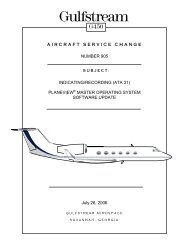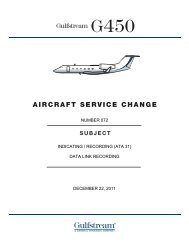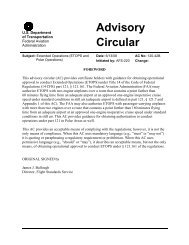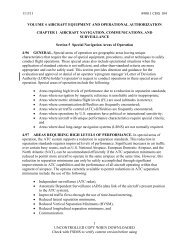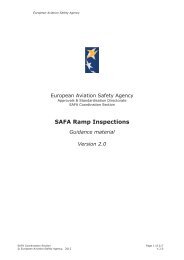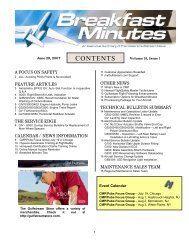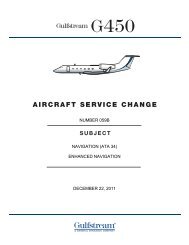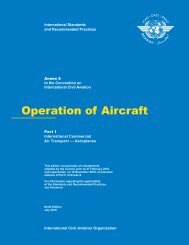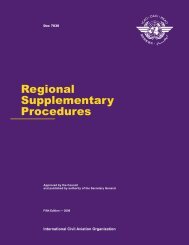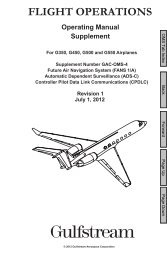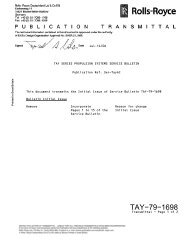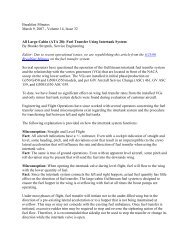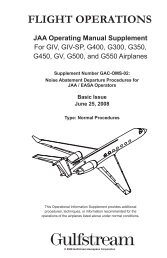AC 120-55C Air Carrier TCAS - Code7700
AC 120-55C Air Carrier TCAS - Code7700
AC 120-55C Air Carrier TCAS - Code7700
Create successful ePaper yourself
Turn your PDF publications into a flip-book with our unique Google optimized e-Paper software.
2/23/11 <strong>AC</strong> <strong>120</strong>-<strong>55C</strong>avoidance system algorithms as defined by RTCA/DO-185, to the <strong>Air</strong>craft Engineering Division,AIR-100, Washington, D.C.14. FAA RESPONSE TO <strong>TCAS</strong> EVENTS. Regarding regulatory compliance issues, the FAAwill not initiate enforcement action solely on the basis of a <strong>TCAS</strong> event. Letters of investigationwill not be sent to pilots involved in a <strong>TCAS</strong>-related deviation provided:a. <strong>Air</strong>crafts Equipped with <strong>TCAS</strong>. The aircraft was equipped with <strong>TCAS</strong>, the system wasoperable, and the equipment was turned on at the time of the event;b. Compliance with ATC Clearances. The pilots have properly operated their aircraft incompliance with ATC clearances prior to the <strong>TCAS</strong>-related deviation;c. Compliance with <strong>TCAS</strong> Training. The pilots have successfully completed their aircarrier’s FAA-approved <strong>TCAS</strong> training program; andd. Compliance with § 91.123. The pilots have otherwise complied with the requirements of§ 91.123.15. FOREIGN AIR CARRIERS.a. General. Section 129.18 requires <strong>TCAS</strong> II installation and use by certain foreign aircarriers when operating in U.S. airspace. Foreign air carriers are not required to install and use<strong>TCAS</strong> for any aircraft or operations taking place outside of the U.S. 12 NM territorial limit(§ 71.9), even though separation services may be provided by a U.S. ATC facility (for example,in oceanic airspace). Various states may abide by ICAO guidance found in <strong>AC</strong>AS Standards andRecommended Practices (SARPS).(1) <strong>TCAS</strong> Approval for Foreign <strong>Air</strong> <strong>Carrier</strong>s. The FAA does not approve <strong>TCAS</strong>installation, training programs, MELs, or maintenance programs for foreign operators operatingnon-U.S.-registered aircraft. Such authorizations are addressed as specified by the State ofOperator or by ICAO. However, since compatibility of <strong>TCAS</strong> and Mode S transponders withother aircraft and NAS facilities within U.S. airspace is essential, the FAA issues part 129operations guidelines for <strong>TCAS</strong> to all foreign air carrier operations within U.S. airspace.Compliance with these <strong>TCAS</strong> provisions ensures both <strong>TCAS</strong> system and proceduralcompatibility. The issuance of OpSpecs, or an amendment to existing OpSpecs for <strong>TCAS</strong>, musttake place before a foreign air carrier operating a <strong>TCAS</strong>-equipped aircraft in U.S. airspace, inaccordance with § 129.18. Standard provisions for foreign air carriers for <strong>TCAS</strong> are shown inAppendix 4.(2) Guidance. Guidance for foreign air carriers operating under part 129 applies tonon-U.S.-registered aircraft as well as U.S.-registered aircraft flying in U.S. airspace. The plan ofState of Registry for U.S.-registered aircraft operated by foreign operators is, for practicalpurposes, that of the U.S. or the same as that for any U.S. operator in order to meet therequirements of § 129.14.Par 13 Page 15



